National cancer research center completely refutes "JT's counterargument on second-hand smoke and lung cancer"

The national cancer research center issued on August 30, 2016 "About 1.3 times the lung cancer risk of Japanese by secondhand smoke - Lung cancer risk assessment From "almost certain" to "sure""Japan Tobacco Inc. (JT) announced that it is difficult to conclude that the relationship between passive smoking and lung cancer has been secured only with this research result. In response to this JT statement, the National Cancer Center responds precisely in every point of discussion and is in a state suitable for calling "complete refusal".
受動喫煙と肺がんに関するJTコメントへの見解 << 国立がん研究センターについて
http://www.ncc.go.jp/jp/information/20160928.html
The beginning of the matter is the following research (this research) announced by the National Cancer Research Center on August 30, 2016.
受動喫煙による日本人の肺がんリスク約1.3倍 << 国立がん研究センター
http://www.ncc.go.jp/jp/information/press_release_20160831.html
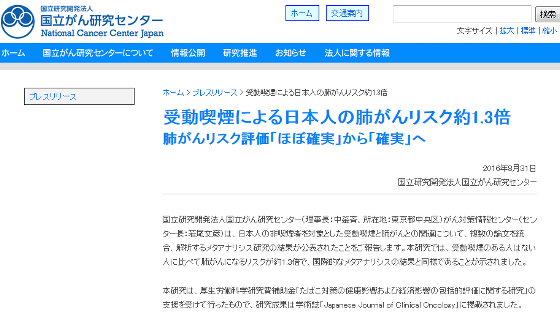
Although the scientific mechanism has been clearly proved, the lung cancer risk that "passive smoking" brings up has been clearly proved, but since the statistical significance was not shown in the epidemiologic study for Japanese, it was "almost certain" Risk assessment was carried out with the expression that. In international research, the association between passive smoking and lung cancer has been proved scientifically and epidemiologically, and the expression "sure" is clearly stated.
This study by the National Cancer Research Center was done to fill out the missing piece "epidemiological proof". Analyze multiple papers integratedlyMeta-analysisFrom the nine experiments targeting Japanese people using the technique named "National Cancer Research Center announced on the website as" statistical significance of "lung cancer risk due to passive smoking is about 1.3 times" was recognized . In response to this result, the National Cancer Research Center deleted the phrase "as much as possible" from the expression "(To avoid smoking of others' as much as possible)" in the description in "Cancer Prevention Act for Japanese" , And suggested that it should be a "clear target" from the conventional policy that prevention of second-hand smoke was "effort target", such as changing to "avoid avoiding".
In JT, which opposed the conclusion of this study, we released the following release "However, it is difficult for JT to conclude that the relationship between second-hand smoke and lung cancer has become reliable only with this research result We believe there is. "
JT comment on announcement of national cancer research center on passive smoking and lung cancer | JT website
https://www.jti.co.jp/tobacco/responsibilities/opinion/fsc_report/20160831.html
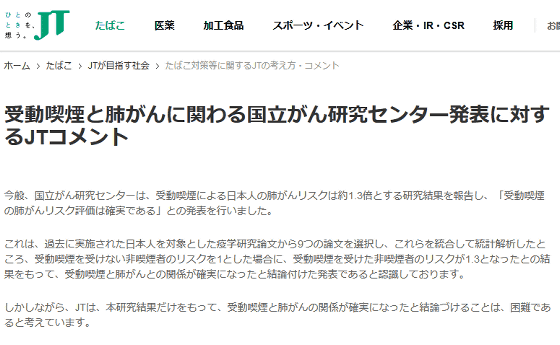
For that reason JT points out the following three points.
◆ 1: Arbitrariness of survey selection
First, the opinion that lung cancer occurs even in a group that does not receive second-hand smoke. In addition, among the nine research studies selected by the National Cancer Center this time, there are 42 lung cancer deaths who do not receive second-hand smoke in about 50,000 non-smoking women, and lung cancer death to which passive smoking was given It is pointed out that there is research showing that the difference is small between 46 people.

On the contrary, the National Cancer Research Center first touched on the phrase "select nine papers by JT". Such expression is as if it is inappropriate because it gives the impression that the National Cancer Research Center arbitrarily selected the paper, he is suffering a bitter jab.

And JT's "The number of lung cancer deaths who do not receive second-hand smoke in about 50,000 non-smoking women is 42, the number of lung cancer deaths who received second-hand smoke is 46" is 9 among the nine articles, I argue that it is an arbitrary choice of a study with the least relative risk due to second-hand smoke. That is why JT who is stinking "Arbitrary selection operation by the National Cancer Research Center" is making arbitrary choices. Furthermore, in the risk assessment, although there was an extremely remarkable result that mortality risk of mortality in lung cancer increased 5.29 times under the condition that "exposure to passive smoking more than 3 hours a day" is high, an excessive evaluation As a result of dare choosing a value of moderate level to avoid, it gave an evaluation of "1.3 times" and stated that the numerical value has statistical significance.
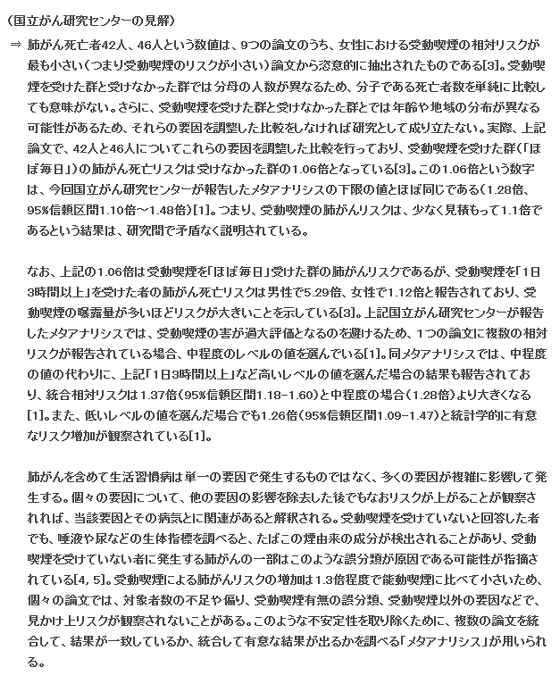
Moreover, even if the research mentioned by JT meets the lower limit of the meta-analysis reported by the National Cancer Research Center and it is a consistent result among other studies, "If you do not receive passive smoking Even for those who responded, when examining biological indicators such as saliva and urine, components derived from tobacco smoke may be detected, and some of the lung cancer occurring in those who have not received second-hand smoke is misclassified There is a possibility that the actual numerical value may be more than the numerical value observed in the experiment.
◆ 2: Statistical significance under different conditions
JT said, "The nine epidemiological studies selected this time have integrated research results with different research times and conditions and statistically insignificant results in any of the studies", the integration of research results with different experimental conditions It is pointed out that the statistical value is low because it is.

On the other hand, the National Cancer Research Center adopts a meta-analysis method to avoid arbitrariness and loss due to different conditions, and based on the international guidelines (PRISMA) in this research We are arguing that we are conducting in a state where reliability is guaranteed.
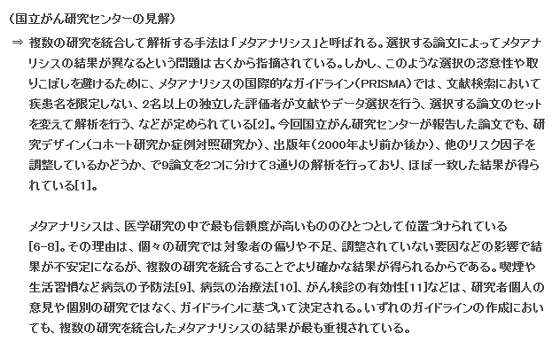
Furthermore, in this study, "In multiple studies with different research times and conditions, there is a result showing the relationship between second-hand smoke and lung cancer, except for one case, which suggests that passive smoking and lung cancer "The fact that the" same result "is obtained even under different conditions is said to suggest a strong association between second-hand smoke and lung cancer, JT pointed out We are taking the opposite way.
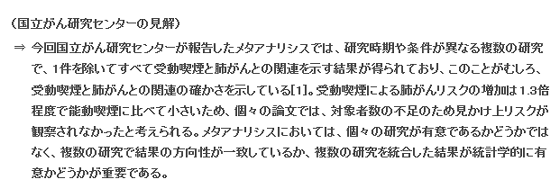
◆ 3: The existence of research leading to different conclusions
JT says that both the result that the risk rises with passive smoking and the result that it can not be said to rise can not be said to be rising, and it is not concluded in a scientifically persuasive manner. " In other words, unlike the present study by the National Cancer Research Center, there is research to assume that there is no risk of lung cancer due to passive smoking, so it is argued that it is not yet a firm conclusion.

On the other hand, the National Cancer Research Center has acknowledged the carcinogenicity of tobacco smokers to people of the International Cancer Institute (IARC), the subordinate organization of the World Health Organization (WHO), and in the Public Health Surveillance Report As concluded that causality is estimated, it states that the risk due to passive smoking is recognized by authoritative research institutions.
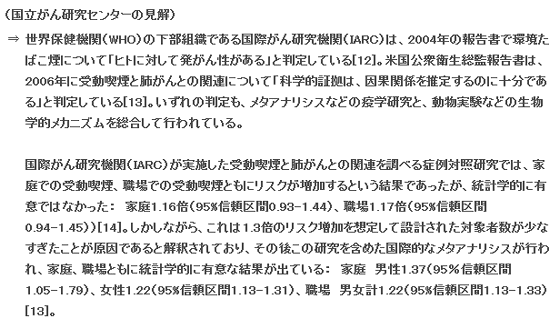
Furthermore, among JT's "research on different conclusions", there is research that is not enough to trust that the fact that tobacco companies such as Philip Morris organically interfered was twisted, and the intention of the tobacco industry We criticize the existence of arbitrary research carried out according to the scourge severely.
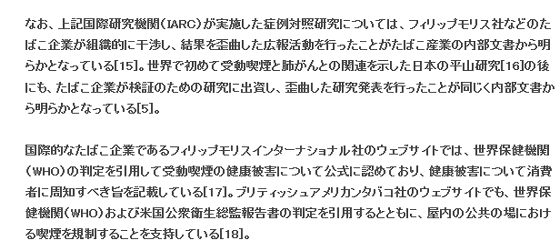
And JT made the final response at the end of the release "For passive smoking, people around the people, especially those who are not smokedAnnoyanceBecause it may be something like JT, to the surrounding peopleAttentive and considerateWe are asking the people who are smoked to be able to show you "on behalf of the intention to ...

"Passive smoking is not a problem of" annoying "or" attentive and compassionate ", but it is a problem of" health damage "" others' harm "" It is abandoned Basari.

It is worth noting that JT who was denied all his claims asserts what kind of rebuttal or just decides.
Related Posts:







